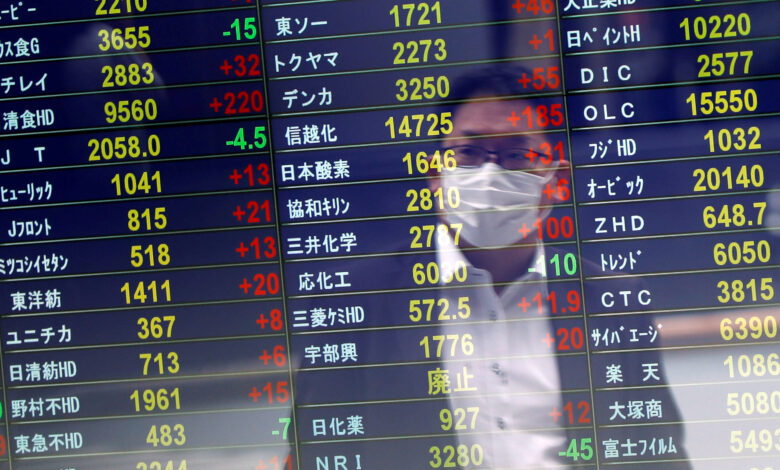Asian stocks fall as a result of the Fed’s aggressive tightening stance.

On Friday, Asian stocks were down because investors were worried about the US Federal Reserve’s plans to raise interest rates more quickly and the effects of China’s lockdowns on the global economy.
The MSCI’s broadest index of Asia-Pacific stocks outside Japan (.MIAPJ0000PUS) fell 1.1 percent in morning trade, the most significant decline in six weeks.
It was dragged lower by a 1.6 percent decline in Australia’s resource-heavy index (.AXJO), a 1.1 percent decline in Hong Kong stocks (.HSI), and a 0.3 percent decline in mainland China’s blue chips (.CSI300).
Japan’s Nikkei (N225) index fell about 2%.
Overnight, US Federal Reserve Chairman Jerome Powell stated that a half-point rate hike is “on the table” for the Fed’s May meeting, adding that it would be appropriate to “move a little more quickly.”
As a result of his comments, market expectations now say that the Fed will raise interest rates by a half-point next month. Nomura now expects 75 basis point increases at the Fed’s June and July meetings, which is the largest since 1994.
US Treasuries fell further on Friday, with the yield on five-year Treasury notes rising to 3.04 percent, the highest level since late 2018.The yield on ten-year Treasury notes was 2.9483 percent, up from the previous close of 2.9076 percent and not far from the 40-month high of 2.9810 percent reached on Wednesday.
The two-year yield, which reflects traders’ expectations for higher Federal Reserve funds rates, reached 2.7408 percent, up from the previous day’s close of 2.6739 percent.
Elsewhere, markets were still reeling from European Central Bank officials’ comments that the bank could begin hiking euro zone interest rates as early as July. Overnight, German two-year yields reached an eight-year high.
Europe’s Euro Stoxx 50 futures fell 2.33 percent, the German DAX futures fell 1.87 percent, and the FTSE futures fell 1.39 percent in early Asian trading. These were all big drops for the Asian time zone.
Shanghai’s prolonged lockdown and its impact on the world’s second largest economy have weighed on domestic stocks and the Chinese currency.
There are a lot of people at Citi who think that China’s economic clampdown is going to make inflation rise even more in the next few weeks and months.
In a note, they wrote, “We continue to believe that inflation concerns will weigh on dovish central bank currencies.”
The US dollar held steady against a group of major currencies on Friday, but it was still well above 100 thanks to rising US Treasury yields.
The dollar gained 0.2 percent against the yen, as the Fed’s increasingly hawkish stance stood in stark contrast to the Bank of Japan’s ultra-loose monetary policy.
In early trade onshore, the Chinese currency, the yuan fell to a new seven-month low of 6.4748. This week, it breached its 200-day moving average.
Despite what Powell said, strong US corporate earnings and jobless claims data were overshadowed by them. This suggests that April was another month of strong job growth.
The Dow Jones Industrial Average (.DJI) fell 1.05 percent, the S&P 500 (.SPX) dropped 1.48 percent, and the Nasdaq Composite (.IXIC) fell 2.07%.
On Friday, oil prices wiggled as supply concerns over a potential European Union ban on Russian oil were offset by demand concerns. US crude was down 1% to $107.17 per barrel, while US crude was down 1% to $102.68 per barrel.
Rate hikes on the horizon weighed on gold. Spot gold was down 0.12 percent to $1,949.58 per ounce at the time of writing.





